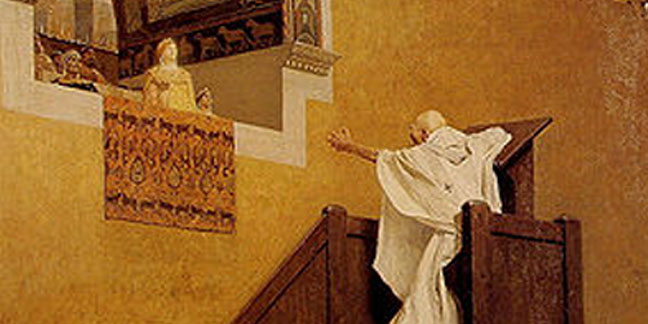St. John Chrysostom (from the Greek "chrysostomos," meaning golden-mouthed) was perhaps the greatest preacher in the history of the Church and the most prominent Greek Father of the Church. The Orthodox and Eastern Catholic Churches also honor him as a saint and count him among the Three Holy Hierarchs, together with St. Basil the Great and St. Gregory Nazianzus.
St. John Chrysostom was born in Antioch around 344 or 347. Soon after his birth, his father, a high-ranking military leader in the Roman Empire, died. John was raised by his mother, and thanks to her influential connections in Roman society he received an excellent classical education under the pagan teacher Libanius. From Libanius, he acquired the skills for a career in rhetoric, as well as a love of the Greek language and literature. As he grew older, however, he became more deeply committed to Christianity. According to the Christian historian Sozomen, Libanius was supposed to have said on his deathbed that John would have been his successor "if the Christians had not taken him from us."
After meeting the holy bishop St. Meletus, John decided to devote his time to the study of religious works and Scripture. He was baptized after three years of study and set out for the desert to live the ascetic life of a hermit. His extreme mortifications left him in fragile health, so he returned to Antioch after two years of recovery and prepared for the priesthood.
He was ordained a priest in 386 and served in the Cathedral of Antioch for 12 years, winning widespread fame for his preaching with insightful expositions of Bible passages and moral teaching. The themes of his talks were practical, explaining the Bible's application to everyday life.
The most valuable of his works from this period are hundreds of homilies on various books of the Bible, which were written down by the audience and subsequently circulated. In them he emphasized charitable giving and was concerned with the spiritual and temporal needs of the poor. He spoke against materialism, conspicuous consumption and the abuse of wealth: "It is not possible for one to be wealthy and just at the same time," he preached in one homily that drew on the Gospel of Matthew. "Do you pay such honor to your excrements as to receive them into a silver chamber-pot when another man made in the image of God is perishing in the cold?"
In 398 John was forcefully appointed Patriarch (Archbishop) of Constantinople, and fast became very popular with his flock through his example of preaching and courage in front of the imperial power, whose corruption and decadence he never shirked from criticizing in public.
He adamantly refused to host lavish social gatherings, which made him popular with the common people but unpopular with wealthy citizens and the clergy. His efforts were met with resistance and limited success, and his outspoken attacks earned him enemies – notably the empress Eudoxia and Theophilus, the bishop of Alexandria, who had him condemned on false charges in 403.
He was exiled to Armenia, where he continued to be a great presence in the Church of the East through his many letters.
In the midst of his sufferings, like St. Paul, the Apostle whom he so greatly admired, he found the greatest peace and happiness. He had the consolation of knowing that the pope, Innocent I, remained his friend and did for him what lay in his power.
His enemies were not satisfied with the sufferings he had already endured, and they banished him still further – from Armenia to Pythius, an isolated place along the Black Sea, at the very extremity of the Roman Empire. He died on his way there on Sept. 14, 407. His last words are said to have been, "Glory be to God for all things."
— Sources: Catholic News Agency, Catholic Online, Wikipedia



